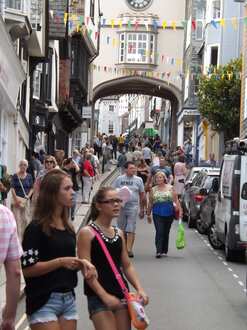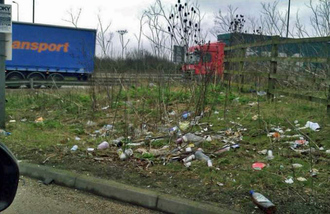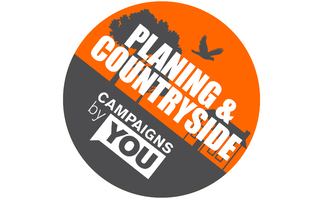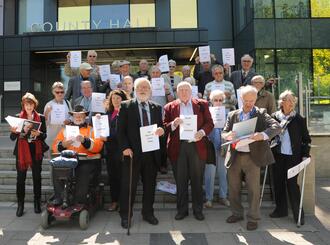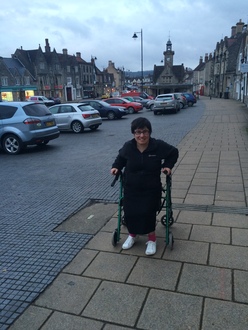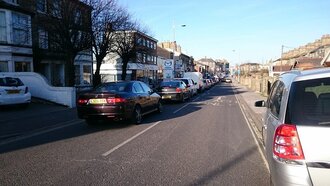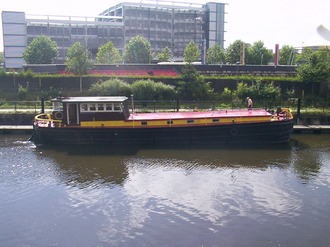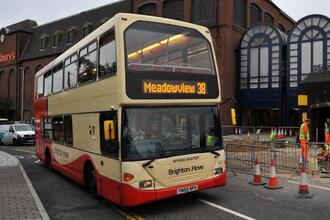-
Save our Free School TransportI strongly believe that this increased distance is to far too expect a child to walk to school, never mind the weather conditions such as the rain and snow. Our children will be tired, cold and maybe even soaked through before they even start school. How can we then expect our children to be able to learn when tired, cold and wet? Thanks to the council amalgamating many schools, the distance that need to be travelled are now much further for many pupils. Many of the children will have to leave the house around 7.30 am to arrive at school for 8.40 and then will not get home until after 4 pm on the days they finish at 3 pm and after 5 when they finish at 4 pm. This would mean that in the winter months they will be expected to walk in the dark under the underpasses and unsupervised as many of the parents will be at work. This is not to mention the overly heavy school bags that they are expected to carry which would also add to tiredness, increased stress and potential health problems such as bad backs, posture and sore feet. Furthermore the children are then expected to complete homework whilst tired and with dramatically compromised concentration levels. Many of the routes to the schools do not have adequate pedestrian walk ways and many areas do not benefit from having regular public buses which can transport children to school. On a normally day the amount of traffic in and around our schools is already extremely heavy. If these plans are approved then there is likely to be more congestion and more danger as parents are forced to transport their children to school themselves. Many parents will simply not be able to ensure that their children can get to school safely as they will have to leave early themselves, to get to work. This will impact family life as the parents may have to reduce their working hours or give up work completely.996 of 1,000 SignaturesCreated by Katie King
-
Don't let rat-runners ruin Totnes!Overturning the RTO would mean a return to rat-running cars that speed through and pollute our streets. Recent figures show that the number of cars driving through the town centre is down by at least 50%, whilst total car parking figures are virtually unchanged. We believe that this historic town has now become a far more pleasant and healthier place for shoppers, visitors and residents. (Photo shows the current relaxed ambience that attracts hundreds to the High Street)752 of 800 SignaturesCreated by Julian Hall
-
Keep Winchester's roads free from litter!Our city is surrounded by beautiful countryside yet the quality of the environment is seriously compromised by the level of litter that is allowed to build up on our roads. Enough is enough.339 of 400 SignaturesCreated by James Miller, Dirty Money Campaign
-
Put speed camera on hallfields road1.cars do 50mph down here 2.A49 has speed cameras59 of 100 SignaturesCreated by Mary Leigh

-
Allow Carers use of the Blue Badge SchemeWhen the Blue Badge Holder is admitted into hospital, his/her carers responsibilities are reduced, however, in order to visit, the disabled person in hospital, the carer must pay full parking charges, which can be £12 a day. The carer may only use the Blue Badge if the disabled person (Blue Badge Holder) is being dropped off or picked up. As Carers Allowance is only £61.35 a week, after some 5 days of visiting the carer is "out of pocket", whereas some hospital car parks are free for Blue Badge Holders.The financial burden, upon the carer, when the disabled person is discharged from hospital, can be quite harsh, especially if the carer has had to pay for parking.739 of 800 SignaturesCreated by Peter George
-
Campaign to save RUH Hopper BusAny cuts to this vital service would cause real hardship to the less able in many parts of Wiltshire2,063 of 3,000 SignaturesCreated by TERRY CHIVERS
-
rights for disabled people to travel on busesTo give disabled people the right to travel where and whenever they wish. My husband and I were asked to leave the bus because the driver said there was no room even though there was a seat by the stairs, he said I couldn't sit there with my rollator unless I could collapse it first and put it somewhere.100 of 200 SignaturesCreated by Sarah Tsang
-
Safer A23 in Streatham CampaignThere is, on average, a significant incident every four days, with someone being fatally or seriously injured every month on Streatham High Road. The road is trying to serve too many purposes. It’s a commuter route, a haulier route, a bus route as well as a busy shopping street. These needs are incompatible. Drivers see the wide road, 3 lanes and lack of speed signs and treat it as a dual carriageway. Research shows half of them break the 30mph speed limit. On the other hand, residents see it as their High Street and dart between cars to make it to the middle section where they stand between six lanes of traffic before making the final dash to Sainsbury’s to pick up some milk. Streatham’s population is growing. There’s the redevelopment of the bowling alley and work’s started on Caesar’s. This is brilliant and such an exciting time for the area but it will only make the risks of the A23 greater. There seems to be a lot of chat on this issue but no action. Lambeth remains London’s deadliest borough with more people dying in Lambeth than anywhere else in London. **Please note this petition is not party political. We have cross-party support. Your contact details will NOT be shared with anyone.**2,292 of 3,000 SignaturesCreated by Charly Lewis
-
LOWESTOFT NEEDS A CENTRAL THIRD CROSSINGFor 50 years the people of Lowestoft have agreed that It is important to ease congestion in the town centre and Oulton Broad. We want to draw people back to trading and shopping in Lowestoft. This polder dam crossing is the option that will bring most economic benefit to the town. It will join the town together after years of being split by the river without destroying existing homes and businesses. It is also the cheapest option, considering all access points are already in place and there are no businesses or homes to be destroyed or relocated, unlike the other options. YET IT IS THE ONE THAT NO ONE IN OUR COUNTY OR DISTRICT COUNCIL HAS SERIOUSLY CONSIDERED!! DESPITE 3 MEETINGS ATTENDED BY HUNDREDS OF PASSIONATE CITIZENS OF LOWESTOFT! The fishing Industry in Lowestoft is vital! As June Mummery from BFP Fish Auctioneers stated:" A third crossing would make access to the Fish Market easier when deliveries of fish and sundries are coming in and out." Emergency vehicles are held up waiting for the current bridge, which opens up several times a day to let small boats through, and every minute lost could cost lives! A polder dam bridge will be a unique tourist attraction in itself, and is the option that will bring most economic benefit to the town. Businesses are currently losing productivity hours while employees are stuck in traffic. It will join the town together after years of being split by the river, without destroying existing homes and businesses. It will benefit public transport. It will improve safe crossing for large articulated lorries which currently get held up. Avoid snarl-ups of through traffic in the town centre. Lets put life back into Lowestoft and draw businesses back into our town!551 of 600 SignaturesCreated by Valerie George
-
Reclaim Our Rivers!The Canal & River Trust's claim upon the river waters of England and Wales violates the ancient law of riparian rights, established by Henry II in 1188. These rights have never been revoked or repealed, just ignored and abused by the authorities over the years. They state categorically that river waters belong to the landowners of the river bank, and that all citizens have the right to navigate these waters unencumbered. The Transport Act 1968 transferred these rights to British Waterways (the forerunner of the Canal & River Trust), but these rights were not Parliament's to give away, as they belong to their rightful owners, the landowners of the river banks and those who wish to navigate the river waters. These rights do not diminish, unlike those associated with footpaths and bridleways. They remain intact, even if they have not been exercised for many years.362 of 400 SignaturesCreated by Edwin Holmes
-
No limitations: STOP discrimination for disabled transport users NOW.No Limitations was established by a group of seven creative minds that still stand today, in partnership with “The Challenge” and “Heathrow Community Fund”, to build more step-free access across all London Underground stations from the streets right onto the train. We all know that there are barely any facilities available, such as lifts and ramps to help disabled users access the tube. It’s for that reason why this campaign No Limitations is aimed to help disabled and buggy users access the London Underground with ease. So far there are only 66 out of 270 tube stations that have disabled access- but it’s not enough! However we can help make a change. By signing this petition, you will help to speed up the process of providing more facilities for disabled users. Did you know that only 38 stations out of the entire London Underground network have step-free access from the streets right onto the trains. Our first mission is to have step-free access from the streets right onto the tube for North Acton and Northolt station for disabled users. Why was this Introduced? A young thoughtful man “Abdul-Rahmaan” experienced a family friend's depression (a wheelchair user) over a long 1 hour work journey from North Acton to Northolt Station, which would only take only 10 minutes by train. The thought occurred to him “what does public transport mean?” – “Transport for the Public”. Therefore - he takes the bus every day, which in busy traffic can often take an hour. 1 hour each morning & each evening; for a ten minute journey. This issue remained silent with him; so Mr Rahmaan, stepped forward introducing the idea of building step-free access facilities for the public to 'The Challenge' and 'The Heathrow Community Fund', which will soon benefit millions of disabled peoples lives in traveling. “My dad's friend is a wheelchair user and has to travel from North Acton to Northolt daily for work; a journey that would take 10 minutes on the train. Due to the lack of disabled facilities in these stations, it means he is unable to access the train.Therefore - he takes the bus every day, which in busy traffic can often take an hour. 1 hour each morning & each evening; for a ten minute journey. This is not fair and has to change" Abdul-Rahmaan, 18474 of 500 SignaturesCreated by Mohamad Elaasar
-
End the Bus Cuts in Brighton and HoveThe proposed cuts to bus services in Brighton and Hove will detrimentally effect some of the most vulnerable areas of Brighton. Particularly the Meadowview area which is home to many low income families and pensioners who will be left completely cut off from the city. The cuts are to affect mostly evening, bank holiday and weekend services leaving many members of our community completely stranded after dark, unable to safely return home, or forced to walk a badly lit and sparsely populated stretches of road. Many of us who regularly use the bus services to Meadowview are disabled and are unable to climb Coombe or Bear road. We strongly oppose the proposed measures as they will affect some of the most vulnerable people in our area leaving them further disenfranchised and segregated from the wider community. Cutting bus services in a city which takes pride in its stance on social inclusion and sustainable development is reprehensible and will have a detrimental affect on some of the most vulnerable members of our community and our environment. We urge you to reconsider the proposed cuts and seek and alternative.432 of 500 SignaturesCreated by Rebecca Freeman
Hello! We use cookies to improve your experience by providing insights into how the site is being used. Find out more.

